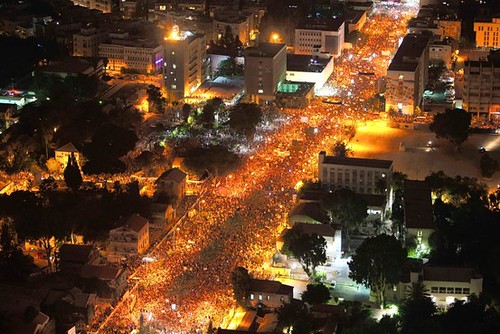
Hundreds of thousands of Israelis have protested in recent weeks over the impact of the world crisis of capitalism which has driven up the prices of housing, food and other basic services. The Israeli government has provided no real response., a photo by Pan-African News Wire File Photos on Flickr.
AUGUST 8, 2011
Israel Protests Press Netanyahu
By JOSHUA MITNICK
Associated Press
Thousands demonstrate in Tel Aviv on Saturday to protest the cost of living, forcing Prime Minister Netanyahu to focus on the economy
TEL AVIV—Massive demonstrations across Israel against the high cost of living point to a revival in the fortunes of the country's long-dormant left-wing movement, forcing Prime Minister Benjamin Netanyahu to focus on economic policy at a time when he enjoys broad support for his handling of policy toward the Palestinians.
In a break with an older generation of Israeli leftists, demonstrators initially dismissed as spoiled youths in Tel Aviv have reached across the country's left-right divide by focusing exclusively on pocketbook issues rather than contested Jewish settlements in the West Bank. Although Mr. Netanyahu's coalition doesn't appear in danger in the short term, it could become vulnerable if the economy plays a role in the next election.
Acknowledging the protests reflect "genuine distress," Mr. Netanyahu on Sunday appointed a committee of cabinet ministers and economic experts to formulate proposals for overhauls. He cautioned, however, that "we won't satisfy everyone."
On Saturday night, more than 250,000 protesters across Israel demonstrated while waving red flags symbolizing old-time socialist political movements, and chanting for "social justice" and a "welfare state." Over the past three weeks, a small tent city in central Tel Aviv protesting runaway rents has snowballed into Israel's largest demonstrations in recent memory, despite Mr. Netanyahu's efforts to demonstrate attentiveness amid the criticism. Real-estate values have gone up more than a third nationwide over the past four years.
Mr. Netanyahu's government doesn't appear under immediate threat because none of the parties in his coalition are threatening to leave over the protests, and the impact on his foreign policy is likely to be limited. Over the past decade, left-wing political parties in Israel have been decimated at the polls by the collapse of the peace process and don't constitute a formidable parliamentary opposition.
"There is a rebirth of a new left," said Dov Khenin, an Israeli parliament member from the far-left Hadash party. "At the moment, there is no political leadership. It is an open question where all this energy will go."
Protesters are rallying a middle class anxious that it can't make ends meet, despite high economic growth and low unemployment. Demonstration leaders claim the government isn't doing enough to offset runaway real-estate prices in large cities, boost a faltering public-education system, and to invest in public health and transportation networks.
Culture Minister Limor Livnat told Israel Radio on Sunday that many supporters of Mr. Netanyahu's Likud party have joined the protests, offering evidence of how a movement initially disparaged as a group of spoiled leftist youths in Tel Aviv has spilled over Israel's right-left political divide.
Both Mr. Netanyahu and Ms. Livnat said on Sunday that Israel's government couldn't risk breaking its fiscal discipline at a time of global uncertainty over the downgrade of U.S. government debt.
Protest leaders have succeeded in appealing to the Israeli mainstream by exclusively focusing on domestic socioeconomic issues rather than how the government's financial support for contested Jewish settlements in the West Bank figures into the economy, a break with an older generation of Israeli leftists.
"In order to be seen as universal as possible in Israeli society, [demonstrators have] said, 'Folks, this isn't about the left-right divide on the Palestinian peace process,' " said Sam Lehman Wilzig, a political-science professor at Bar Ilan University.
Speaking to a packed and sweaty crowd of 200,000 stretching for blocks in central Tel Aviv, Dafni Leif, a 26-year-old video editor who started the protest with a Facebook page, assailed Mr. Netanyahu's policies as "extremist capitalist." Similar criticism played a role in Mr. Netanyahu's election defeat in 2006, when economic issues were prominent.
Mr. Lehman Wilzig said the protesters aren't advocating a return to Israel's socialist economy of the 1950s and 1960s, but are demanding more intervention to promote equal access to education and more competition in an economy dominated by a few large tycoons.
The movement could be overshadowed next month, when the Palestinians prepare a bid for full United Nations membership. Mr. Netanyahu is less likely to abandon his traditional right-wing political base for a surprise diplomatic compromise amid pressure from the center and left.
Despite the approaching showdown at the U.N., political commentators suggest that the size and duration of the demonstrations could reshape Israel's public agenda over the longer term. If the public thinks there has been no progress, that would create a domestic opening to challenge Mr. Netanyahu in the next election.
"This is no fleeting whim, a one-time event, but something that is congealing into a mass movement," wrote Nahum Barnea, a columnist for the daily newspaper Yediot Ahronot. "Netanyahu and his ministers won't be able to ignore this outcry. Not because they believe that that outcry is justified, but because it reflects a force that threatens their continued hold on power."
No comments:
Post a Comment